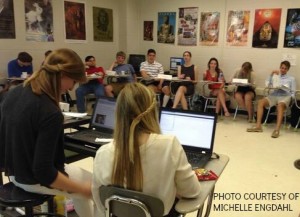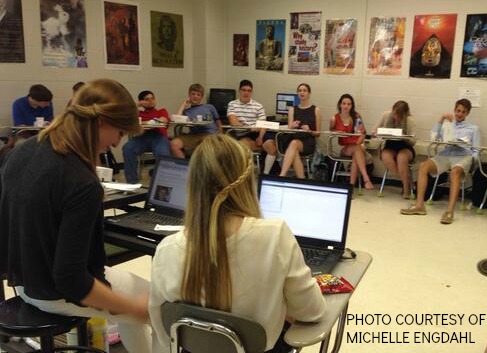
On May 19, 2014, Mrs. Engdahl’s AP World History class joined with Leesville’s Model UN team to create a simulation of a Model UN conference.
Model UN chose a Joint Crisis committee in which students were paired up and given a country to represent and a crisis to solve. A
Joint Crisis Committee (JCC) is a type of committee found at the actual United Nations that is formed in order to find a diplomatic solution to a pressing crisis. The topic for this debate was World War Two, and each student was assigned a country included in the Allied powers.
“I feel like if we didn’t have a crisis committee, it would have been dead. So I think the crisis committee really helped out to spice things up and keep things going.” said Lauren Hudak, a Model UN-er who chaired the debate with Heather Crew.
The class, as a whole, had to make decisions together in order to prevent Hitler and the growing Axis powers from gaining power. The Model UN team stressed the idea that they were not reliving history, they were rewriting it to whatever they wanted.
Over the course of two hours (third period and lunch) the students delegated and debated on how to resolve any WWII issues presented to them by the crisis committee consisting of Model UN members.
“The crisis committee was a group of three of us who took all of the directives past by the Model UN group and then reacted to them the way other countries would have reacted,” said Abbott Gaddy, a member of the crisis committee.
Issues including invasions of Belgium and skirmishes on the eastern Russian border with Mongolia. The students made and voted on decisions called directives. The crisis committee would then take these directives and decide their outcomes.
“It was a simulation of the real League of Nations/UN procedure and we just simulated events that could’ve taken place in history but didn’t,” said Kendall York, a World History student who participated in the event.
For example, when the delegates discovered German planes attacking the capital of Belgium, they passed a directive to send troops from several places including South Africa and Poland to defend the city. Then the crisis committee decided that troops from Poland were well received yet troops from South Africa did not get there on time.
These sorts of decisions and actions passed the time in Engdahl’s classroom. Students advocated for increase in military spending and training troops in order to protect themselves from the Axis powers. They learned about delegation and teamwork in order to produce an outcome favourable to their side.
At the end of the two hours, only one battle had been settled in favour of the Axis powers, but the war was far from over. However, third period was coming to an end, and the crisis committee decided to end the war early.
Then the two chairs, Heather Crew and Lauren Hudak, handed out a few awards including best delegation and acting the most like their country.
“It was a great way to really tie off what was a great initial year of the real model UN team.” said Crew.

Leave a Reply